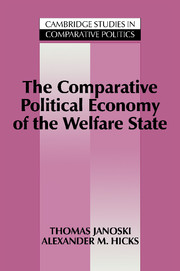Book contents
- Frontmatter
- Contents
- List of contributors
- List of tables and figures
- Preface
- 1 Methodological innovations in comparative political economy: an introduction
- PART I TIME-SERIES ANALYSIS
- PART II POOLED TIME-SERIES AND CROSS-SECTIONAL ANALYSIS
- PART III EVENT HISTORY ANALYSIS
- 9 Introduction to event history methods
- 10 Welfare state development in a world system context: event history analysis of first social insurance legislation among 60 countries, 1880–1960
- 11 British and French political institutions and the patterning of decolonization
- PART IV BOOLEAN ANALYSIS
- Author index
- Subject index
11 - British and French political institutions and the patterning of decolonization
Published online by Cambridge University Press: 05 June 2012
- Frontmatter
- Contents
- List of contributors
- List of tables and figures
- Preface
- 1 Methodological innovations in comparative political economy: an introduction
- PART I TIME-SERIES ANALYSIS
- PART II POOLED TIME-SERIES AND CROSS-SECTIONAL ANALYSIS
- PART III EVENT HISTORY ANALYSIS
- 9 Introduction to event history methods
- 10 Welfare state development in a world system context: event history analysis of first social insurance legislation among 60 countries, 1880–1960
- 11 British and French political institutions and the patterning of decolonization
- PART IV BOOLEAN ANALYSIS
- Author index
- Subject index
Summary
While the literature on twentieth-century decolonization occasionally ventures into comparison across empires (Emerson 1960; Smith 1978; von Albertini 1982; and Holland 1985), there is little quantitative research into the processes producing imperial collapse. This chapter presents an event history analysis of the precipitants of decolonization in the two major Western empires: the British and the French. It contrasts the way British and French political institutions shaped the pattern of imperial breakdown.
Elsewhere, I argue that metropolitan political institutions organized around expanded forms of citizenship promote decolonization (Strang 1990, 1991a, 1992). The rise of the nation-state produces a tension between the political theories and structures of the metropolis (where rights are expanded) and the colony (where they are not). New models of the state diffuse to the colonies and inform peripheral nation building. And metropolitan powers organized as nation-states can neither accommodate nor easily repress such nationalisms. They are unwilling to extend full membership to the colonized and find it unappetizing to crush movements constructed around Western models.
Expanded incorporation may be conceived in the terms Marshall (1964) made famous: legal, political, and social citizenship. Of the three, disparities in legal status are the least obviously pertinent to decolonization. Disputes between “natives” were often referred to indigenous law, but this mainly reflected the administrative weakness of the colonial state. It was the growing gulf between the political and social citizenship of Europeans and colonized peoples that produced distinctive tensions.
- Type
- Chapter
- Information
- The Comparative Political Economy of the Welfare State , pp. 278 - 296Publisher: Cambridge University PressPrint publication year: 1994
- 8
- Cited by



